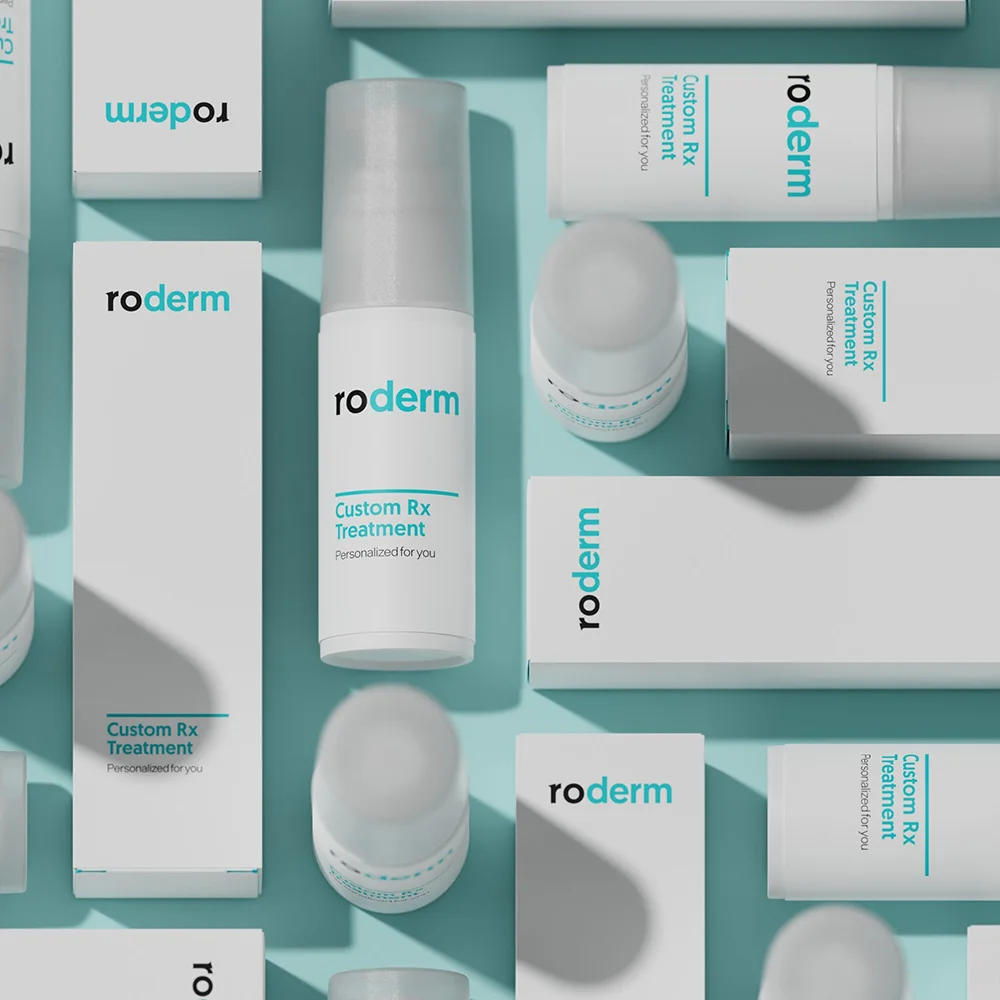Here's what we'll cover
Here's what we'll cover
When typical over-the-counter products don’t stand up to your stubborn zits, strong acne medication may deliver the results you need. A variety of topical medications, oral prescriptions, and procedures are within reach to help you win the battle against persistent pimples and scarring. Read on to learn about some of the best treatments recommended for severe acne.
How does severe acne develop?
Acne, or acne vulgaris, develops when your skin pores or hair follicles get clogged with dead skin cells, bacteria, and sebum—an oily substance that your body makes to nourish and lubricate your skin.
These substances clog your pores, leading to inflammation and acne lesions. Moderate to severe acne has a larger number of lesions than mild acne. Sometimes, if the inflammation is severe enough, it can also lead to deeper lesions, like cysts and nodules, and eventual scarring (Oon, 2019).
Genetic, hormonal, and environmental factors may all foster the development of severe acne. For example, some skin issues may run in families. Others may be caused by makeup, hair products, certain foods, or certain medications (Heng, 2021; Leung, 2021). Problematic pimples can also stem from hormonal changes brought on by menstruation, pregnancy, menopause, androgen replacement therapy, or metabolic disorders (Oon, 2019).
Squeezing or popping whiteheads or blackheads can worsen acne as well. When you squeeze or pop a pimple, you can spark more inflammation, resulting in papules, pustules, nodules, or cysts, depending on the level of inflammation and the amount of tissue involved (Leung, 2021).
The best acne treatment for your skin depends on the type and severity of acne you have. However, delaying treatment can lead to more severe acne scarring (Agrawal, 2020).
Strongest acne medications
Potent acne meds are usually prescribed in cases of chronic, severe breakouts. They normally take some time and consistent application to show improvement. And because acne has a few different causes, remedies vary in how they target troublesome symptoms.
Azelaic acid
Azelaic acid (see Important Safety Information) is included in many skincare formulas for its antioxidant and antimicrobial potential. Also, this treatment helps clear acne-prone skin by both acting against skin bacteria and decreasing inflammation (Hashim, 2018). Azelaic acid is available in low, over-the-counter concentrations and stronger, prescription versions.
Retinoids
Retinoids are widely used medications for treating and reducing acne that can lead to scarring. They are derived from vitamin A, and the stronger versions are available only with a prescription. Tretinoin (brand name Retin-A; see Important Safety Information) is a topical retinoid treatment approved by the FDA for acne vulgaris (Yoham, 2022).
Isotretinoin, formerly sold under the brand name Accutane, is a powerful oral retinoid used to treat moderate to severe acne, especially when other treatments fail.
Topical antibiotics
Topical antibiotics help prevent the growth of acne-causing bacteria on your skin. Some are effective on their own, while others may be applied as part of a skincare regimen to counter breakouts. These tend to have fewer adverse effects than oral antibiotics and can be suitable for mild to moderate acne.
One topical antibiotic, clindamycin, prevents bacteria from growing and reduces the swelling, pain, and discomfort that often accompany inflammatory acne. Erythromycin is another antibiotic for inflammatory acne prescribed for topical or oral use.
Dermatologists normally recommend using topical antibiotics in combination with other therapies, like topical retinoids and benzoyl peroxide, to prevent antibiotic resistance (Zaenglein, 2018).
Oral contraceptives
In cases of hormonal acne, oral contraceptives may help curb persistent acne breakouts. Birth control pills can help reduce androgen levels and sebum production. Bear in mind that it may take a few months to see a difference in your acne, and the pill can cause side effects at first.
The FDA has approved three hormonal birth control pills (as well as their generic counterparts) for treating acne: Estrostep, Ortho Tri-Cyclen, and Yaz. They all contain progestins and estrogen, so providers only prescribe them to women.
Oral antibiotics
If topical antibiotics fail to clear your stubborn acne, your healthcare provider might recommend an oral antibiotic. They work by reducing the level of acne-inducing bacteria on the skin’s surface and help decrease inflammation (Chien, 2019).
Some of the types of oral antibiotics that healthcare providers prescribe to treat acne are (Zaenglein, 2018):
Tetracyclines like doxycycline, minocycline, and sarecycline (Moore, 2020)
Trimethoprim, with or without added sulfa
Amoxicillin
These medications, also called systemic antibiotics, are typically prescribed along with other therapies like topical retinoids, topical antibiotics, benzoyl peroxide, and/or hormonal therapy (Guzman, 2018).
If your healthcare provider prescribes an oral antibiotic to you, be sure to follow their instructions closely and take the medication until it’s gone, even if your acne improves early. It can take three to four months to see results. This type of medication may not be suitable in cases of pregnancy or drug intolerance.
Spironolactone
Spironolactone, a diuretic, isn’t FDA-approved for treating acne, but many healthcare providers can prescribe it off-label for severe acne that doesn’t respond to other medications. It blocks the effects of male sex hormones called androgens to help decrease sebum production. Many people take spironolactone with no adverse effects, but some individuals may experience dizziness, headache, vomiting, breast tenderness, or menstrual issues (Zaenglein, 2018).
Other treatments for severe acne
While antibiotics have proven to be effective in fighting stubborn acne, antibiotic resistance is a growing concern (Bengtsson-Palme, 2018). Mounting evidence suggests that using these medications may affect your gut bacteria (Pilmis, 2020). If this concerns you, your healthcare provider may point you to other methods to control your acne and treat scars.
The following treatments have been well-tolerated and effective in many severe acne cases (Tam, 2022):
Chemical peels
Dermabrasion
Dermal fillers
Excision
Laser therapy
Microdermabrasion
Microneedling
Punch techniques
Radiofrequency
Subcision
Thread lifting
Be aware that these techniques may carry risks of bruising, infection, bleeding, and injury. After consulting your healthcare provider, look for a licensed or certified professional with expertise in your chosen procedure.
Which acne medication is best for you?
No one acne product or procedure is best for all situations. That doesn’t make your situation hopeless, though. If over-the-counter medications fail you, talk with your healthcare provider to help uncover any underlying causes of your chronic breakouts. They may refer you to a skincare specialist who can assess your issues and suggest a suitable treatment.
Whatever your healthcare provider prescribes or recommends, following through on your regimen will help ensure and maintain improvement in your skin. You’ll be more likely not to encounter future outbreaks, too.
Be aware that some of these solutions come with side effects which may include skin dryness, irritation, sensitivity to light, stomach upset, or even birth defects. Please research carefully and discuss any concerns with a healthcare professional.
DISCLAIMER
If you have any medical questions or concerns, please talk to your healthcare provider. The articles on Health Guide are underpinned by peer-reviewed research and information drawn from medical societies and governmental agencies. However, they are not a substitute for professional medical advice, diagnosis, or treatment.
Agrawal, D. A. & Khunger, N. (2020). A morphological study of acne scarring and its relationship between severity and treatment of active acne. Journal of Cutaneous and Aesthetic Surgery, 13 (3), 210. doi:10.4103/JCAS.JCAS_177_19. Retrieved from https://www.jcasonline.com/article.asp?issn=0974-2077;year=2020;volume=13;issue=3;spage=210;epage=216;aulast=Agrawal
Bengtsson-Palme, J., Kristiansson, E., & Larsson, D. G. J. (2018). Environmental factors influencing the development and spread of antibiotic resistance, FEMS Microbiology Reviews, 42 (1). doi:10.1093/femsre/fux053. Retrieved from https://academic.oup.com/femsre/article/42/1/fux053/4563583
Chien, A. L., Tsai, J., Leung, S., et al. (2019). Association of Systemic Antibiotic Treatment of Acne With Skin Microbiota Characteristics. JAMA Dermatology, 155 (4), 425–434. doi:10.1001/jamadermatol.2018.5221. Retrieved from https://jamanetwork.com/journals/jamadermatology/fullarticle/2723498
Guzman, A. K., Choi, J. K., & James, W. D. (2018). Safety and effectiveness of amoxicillin in the treatment of inflammatory acne. International Journal of Women’s Dermatology, 4 (3), 174–175. doi:10.1016/j.ijwd.2018.03.006. Retrieved from https://www.sciencedirect.com/science/article/pii/S2352647518300170?via%3Dihub
Hashim, P. W., Chen, T., Harper, J. C., et al. (2018). The efficacy and safety of azelaic acid 15% foam in the treatment of facial acne vulgaris. Journal of Drugs in Dermatology: JDD, 17 (6), 641–645. Retrieved from https://jddonline.com/articles/the-efficacy-and-safety-of-azelaic-acid-15-foam-in-the-treatment-of-facial-acne-vulgaris-S1545961618P0641X/
Heng, A. H. S., Say, Y. H., Sio, Y. Y., et al. (2021). Gene variants associated with acne vulgaris presentation and severity: a systematic review and meta-analysis. BMC Medical Genomics , 14 , 103. doi:10.1186/s12920-021-00953-8. Retrieved from https://bmcmedgenomics.biomedcentral.com/articles/10.1186/s12920-021-00953-8
Leung, A. K., Barankin, B., Lam, J. M., et al. (2021). Dermatology: How to manage acne vulgaris. Drugs in Context, 10, 1–18. doi:10.7573/dic.2021-8-6. Retrieved from https://www.drugsincontext.com/wp-content/uploads/2021/10/dic.2021-8-6.pdf
Moore, A. Y., Del Rosso, J., Johnson, J. L., et al. (2020). Sarecycline: a review of preclinical and clinical evidence. Clinical, Cosmetic and Investigational Dermatology, 13 , 553–560. doi:10.2147/CCID.S190473. Retrieved from https://www.ncbi.nlm.nih.gov/pmc/articles/PMC7431453/
Oon, H. H., Wong, S. N., Aw, D., et al. (2019). Acne management guidelines by the dermatological society of singapore. The Journal of Clinical and Aesthetic Dermatology, 12 (7), 34–50. Retrieved from https://www.ncbi.nlm.nih.gov/pmc/articles/PMC6715335/
Pilmis, B., Le Monnier, A., & Zahar, J. R. (2020). Gut Microbiota, Antibiotic Therapy and Antimicrobial Resistance: A Narrative Review. Microorganisms, 8 (2), 269. MDPI AG. doi:10.3390/microorganisms8020269. Retrieved from https://www.mdpi.com/2076-2607/8/2/269
Tam, C., Khong, J., Tam, K., et al. (2022). A comprehensive review of non-energy-based treatments for atrophic acne scarring. Clinical, Cosmetic and Investigational Dermatology, 15, 455–469. doi:10.2147/CCID.S350040 Retrieved from https://pubmed.ncbi.nlm.nih.gov/35359828/
Yoham, A. L. & Casadesus, D. (2022). Tretinoin. StatPearls . Retrieved from https://www.ncbi.nlm.nih.gov/books/NBK557478/
Zaenglein, A. L. (2018). Acne Vulgaris. The New England Journal of Medicine, 379 (14), 1343–1352. doi:10.1056/NEJMcp1702493. Retrieved from https://pubmed.ncbi.nlm.nih.gov/30281982/










